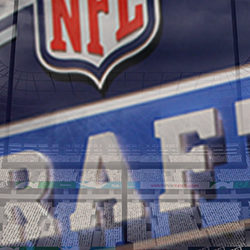
In response to “The Only Way to Beat the NFL Draft: Trade with Someone Who Thinks They Can!”, there are some qualitative arguments to support the Eagles giving up many picks to trade up for the #2 draft pick this year. This is not an endorsement for their trades. However, in trading, when we find ourselves with a significantly different opinion than a counterparty (or the marketplace), it is useful to try to put the other side on a hand to think about why they’re making the bet that they are.
From a qualitative perspective, it seems like it is less clear that trading up for Carson Wentz was so bad for the Eagles. The organization has essentially decided that the quarterback from North Dakota State can be their franchise quarterback. Personally, I think it is difficult to evaluate how a player will compete in the NFL when they’ve only competed against non-Division 1 schools. However, of the four other FCS quarterbacks chosen in the first round (Steve McNair, Joe Flacco, Phil Simms, and Doug Williams), three have been Super Bowl MVPs and the other came about an inch away (Steve McNair in Super Bowl 34). Though this comes from a small sample size, it is interesting that the group has had some degree of success in their careers.
Importance of the QB
It is well known by football fans that the quarterback is the most important position on the field. Tom Brady has a mediocre wide receiving and running back corps supporting him, yet still produces one of the top offenses year after year. The QB touches the ball on every single offensive possession and dictates the offense. In 1977, the average football team threw the ball just 42.3% of the plays. Since then, we have seen an increase to 56% in 2003 and another jump to 60% in 2016. These numbers are even lower than the percent of plays that are designed as a pass, because when the quarterback scrambles, we consider this to be a run when the play was really designed as a pass. The game appears to be trending from this “pound the run” type of mentality towards “pass happy” offenses, making the quarterback position even more important of a role now than it was in the past. Teams that are the best contenders to be Super Bowl champions seem to always have one thing in common: a strong quarterback.
The Need for Change
In my opinion, it is pretty clear that Sam Bradford is not the guy for the future. In 2015, he ranked 31st in total quarterback rating (QBR is a statistical measure that incorporates contexts and details of throws and what they mean for wins) and has not had a single season above average using this same metric in his five year career. Given how important a quarterback is in creating an elite team, the Eagles need someone new under center to lead the team if they want to be Super Bowl contenders.
Philadelphia also has the benefit of not throwing Carson Wentz into the fire. With Sam Bradford under center, the Eagles can wait to start Wentz until later in the season or even in a couple years if Bradford can unexpectedly turn it around and produce a good season. This formula worked out really well for Philip Rivers, Aaron Rodgers, and Tom Brady. Granted, learning from Sam Bradford is not quite the same as learning from Drew Brees, Brett Favre, and Drew Bledsoe, respectively. It is also interesting that the Eagles signed Bradford to a 2-year, $22 million guaranteed contract in March 2016. Some may view this as a high price to pay for an underperforming QB.
The Eagles made a “move up” trade in 1999 when they gave up four players to advance only six spots in the draft to get Donavon McNabb. Obviously, that trade worked out very well for the franchise, as he became one of the best Eagles quarterbacks of all time. If the Eagles solely looked at the positive outcome from the McNabb trade as justification for the Wentz trade, I would say they fell victim to hindsight bias. Hindsight bias describes the act of looking back on a decision and determining whether it was the correct decision based off the result. If you bet 100 dollars to win 300 dollars on the flip of a fair coin and lost, it would still be a good decision even though it led to a financial loss. In trading at SIG, we attempt to not use hindsight bias, so I will not use this as an argument to support the trade, but it may have been an actual factor in the Eagles’ decision.
Demand is far Greater than Supply
In the next few years, a lot of teams will be looking for quarterbacks. Ben Roethlisberger of the Pittsburgh Steelers is 34 years old, Carson Palmer of the Arizona Cardinals is 36, Drew Brees of the New Orleans Saints is 37, Tom Brady of the New England Patriots is 38, Eli Manning of the New York Giants is 35, Philip Rivers of the San Diego Chargers is 34, and Tony Romo of the Dallas Cowboys is 36. Plenty of teams with weak quarterbacks will also be looking to fill the spot (Cleveland Browns and San Francisco 49ers are good examples). For the next few years, the supply of NFL starter-caliber quarterbacks seems to be much lower than the demand. This means the Eagles might have had to pay up even more if they want to acquire a solid quarterback in the future. The organization could also get more for what they currently have by trading Daniel, Bradford, or Wentz. If Wentz performs equal to expectation, it is possible the Eagles can get more for him than what they gave up. Understanding supply and demand is important in trading players or draft picks and something SIG traders use when making trading decisions. Supply and demand can vastly change the value of an asset.
The Eagles have stacked up the most important position in football, one that many teams will be desperately searching for in future years. For the first time since Donovan McNabb, they have invested in a young quarterback and will build their team around him rather than trying to make up for a mediocre quarterback by having great players in other positions.
Bottom line: I am not saying that they didn’t overpay in giving up five draft picks to receive two, but we can now see how the changing dynamics of the league has increased the value of the quarterback position.




Subscribe Now
Get each new post sent straight to your inbox